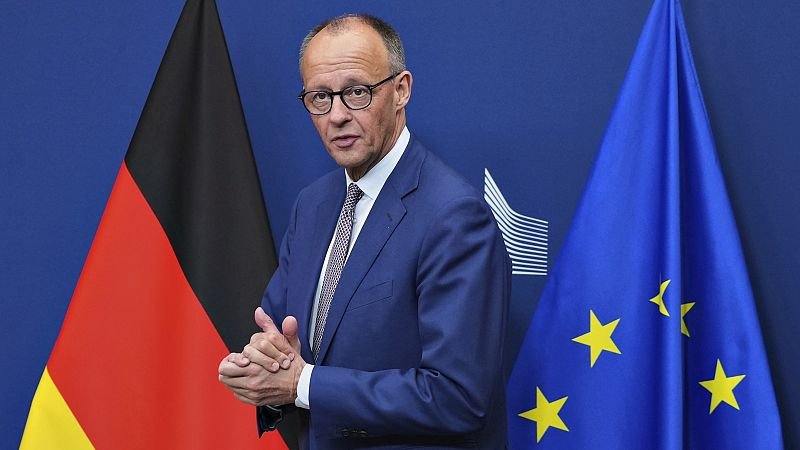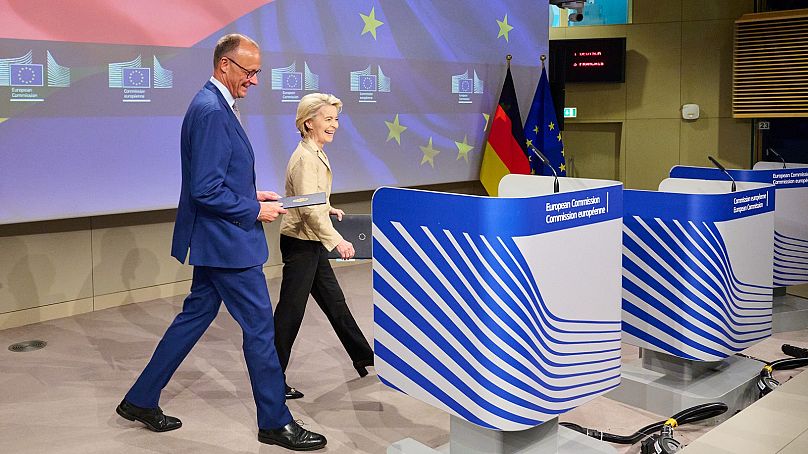
Merz Excludes Permanent Shared Debt at EU Level During Brussels Visit
Friedrich Merz, who has become the new federal chancellor of Germany, delivered a clear message during his inaugural visit to Brussels after assuming power.
He stated emphatically, ‘It must not become standard practice for us to incur debt at the European Union level.’
During individual press conferences alongside Ursula von der Leyen, who leads the European Commission, and António Costa, head of the European Council, the German leader made his stance clear regarding jointly issued debt among the 27 member countries—a mechanism used in 2020 to establish a €750 billion recovery package for tackling the impacts of COVID-19.
Following that pioneering initiative, an increasing number of nations have proposed replicating this approach to address various issues currently confronting Europe, such as declining economic competitiveness, efforts to combat climate change, phasing out fossil fuel imports from Russia, and most recently, boosting defense expenditures.
In early March, von der Leyen introduced the “Readiness 2030” initiative aimed at investing up to
€800 billion
In revitalizing the EU and enhancing deterrence, the strategy includes €150 billion in low-interest loans. These funds would be repayable solely by those member states that utilize them. Meanwhile, additional financing is intended to come from temporarily easing budgetary constraints and launching fresh ventures involving collaboration with the private sector.
On Friday, Merz argued for the necessity of tapping into financial markets to increase military spending but cautioned against applying this strategy to other policy domains. Prior to assuming his role, the conservative politician
spearheaded
A constitutional modification in Germany to exclude defense and security expenditures exceeding 1% of the country’s GDP from the aforementioned “debt brake.”
“The chancellor stated that we are encountering global crises and challenges that are turning into persistent issues, which should not serve as a foundation for enduring collective European debt.” This was spoken alongside Costa.
Subsequently, alongside von der Leyen, he reiterated his previous statement.
Exceptional situations may arise, like those seen during the COVID-19 pandemic. Another scenario we face now involves bolstering our defense resources,” he stated. “However, it must stay unusual for the European Union to accumulate debt.
Merz likewise expressed worries regarding the strain that ongoing government expenditures could impose on member nations, particularly those whose debts have surpassed the threshold of 100% of their GDP.
“He wondered how far the refinancing, including both the debt and the interest rates, will be feasible. They can’t get caught in perpetual cycles of borrowing,” he stated.
“We should focus on finding collaborative solutions; however, this goes beyond financial matters. Efficiency is equally crucial,” he emphasized, advocating for simplified regulations, standardized processes, and larger scales of operation as alternate approaches.
The discussion about debt will intensify as soon as the Commission presents its suggestion for
the EU budget
In 2028-2032, a completely new repayment mechanism will be implemented to settle the outstanding debts accrued from the COVID recovery fund. Payments
are estimated
To be substantial, varying between €13 billion and €15 billion annually up to 2058.
The commission’s unveiling, anticipated by the end of this year, is set to ignite an extensive, intricate, and probably contentious discussion amongst the member countries.
For instance, Spain has proposed increasing the EU’s budget from its present level of €1.2 trillion to €2 trillion by utilizing shared debt. In contrast, countries like Lithuania, Latvia, Estonia, Poland, and Greece advocate for grant-based funding specifically aimed at defense expenditures. These grants, unlike the loan system suggested by Von Der Leyen, would require collective repayment among member nations.
Finland and Denmark, which have historically been known for their thriftiness, have changed course and adopted a more adaptable stance. They contend that Russia’s belligerent actions call for fresh approaches. In contrast, the Netherlands remains steadfast in its longstanding principle against increased shared borrowing.
Achieving the impossible task of squaring the circle will happen only when Germany and France, the two biggest economic powers within the EU, reach an agreement. Paris has frequently advocated for creative approaches to the European Union’s budget, despite this.
it struggles
To control its rapidly increasing debt levels.
It’s bound to be a challenging conversation. Divergent viewpoints are expected,” Merz acknowledged. “Germany and France don’t always see eye to eye, yet we’re still meeting and discussing these issues.
Merz’s trip to Brussels aligned with Europe Day.
Share this content:




















Post Comment